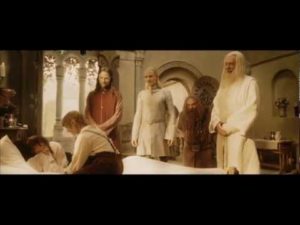For a Lenten selection, this psalm is pretty sunny-side up and cheerful. Maybe as Lent is coming to a close, we are supposed to see in this poem the promise of restoration beyond the cross toward which we are journeying this season. This is, after all, one of the “Songs of Ascent” in the Book of Psalms and so was among the songs the pilgrims sang en route to Jerusalem for one of Israel’s sacred festivals. As such, this song remembers a time of restoration even as it looks forward to still more such restoration in a future that will be rich with good food and verdant crops.
Whatever the precise restoration that is being envisioned here, it is clearly presented as a kind of dream come true. How often haven’t we seen it in films or in novels and in our own lives that when something beautiful happens—especially if there had been prior circumstances that made this wonderful thing seem unlikely ever to happen—somebody grins from ear to ear even as he or she says, “Wait, am I dreaming? Is this really happening? Can this be true?”
It reminds me of an iconic photo many of us have seen before of a family welcoming home their husband/father after he had been a POW for a long time in Vietnam. If you look closely at the picture below, you will notice that the elder daughter’s feet are quite literally not touching the ground as this picture was snapped. They never thought this day would come. And then it did.

“We were like people living in a dream” the psalmist writes. “Our mouths were filled with laughter.” Some things are so unexpected and yet so good they quite literally seem, as we say, “too good to be true.”
But the psalmist knows it is the Lord God of Israel that accomplished such wonders. No one else could have pulled it off. It was even described as a witness to other nations who were supposed to peer in on Israel’s restored fortunes and give the God of Israel the glory for his works. For its part, then, Israel also had to make clear the source of their wonderment: it was not sheer dumb luck, it was not a result of their own hard work, it was not something they deserved all things being equal. No, this was a divine gift and a divine intervention plain and simple.
So maybe we can understand the placement of this psalm so late in the Lenten Season after all. Because where we are headed is a cross and beyond that an empty tomb. Only the power of God could turn the dead-end of a cross into a gateway to new life. Only the power of God could raise a thoroughly dead man in a way that went beyond mere resuscitation but instead pointed to a whole new humanity, a whole new creation, a whole new modality of being in a life that would never end. To God be all the praise and glory!
And maybe we need to note another thing as well: we also need to savor these Gospel truths as being very nearly too good to be true. Perhaps for even us Christians we have become altogether too accustomed to Good Friday and Easter. Maybe we cannot imagine anymore running toward the risen Christ with such joy and abandon that our own feet very literally are not touching the ground. Are our own mouths filled with laughter? Do we feel like we are living out a dream come true in ways that thrill us beyond the telling of it? If not, we might need to re-check our own spiritual perceptions and what it is we truly believe is true about this universe now because of the singular saving work of Jesus the Christ.
When humanity’s fortunes are restored, may it be marvelous in our own eyes, may our mouths be filled with laughter, may we know that at the end of the cosmic day, our grandest dreams really have come true because, as it turns out, this was also God’s own dream for how things were supposed to go in his good cosmos.
Note: Our special Year C webpage for Lent and Holy Week Resources is now available. Please check out additional sermon ideas, sample sermons, and more by visiting this resource page.
Illustration Idea
In addition to that POW photo in this sermon commentary, the kind of delirious joy and laughter that Psalm 126 describes reminds me of one of the latter scenes in both the novel and the film version of J.R.R. Tolkien’s “Lord of the Rings” trilogy. The heroic Hobbits Frodo and Sam have finally accomplished their mission of destroying the evil Ring of Power that once belonged to the wicked and powerful Sauron. But for the last long while before they accomplished this, they were under the impression that their one-time mentor and friend, the wizard Gandalf the Gray, had died before their very eyes in the caverns of Moria and in the clutches of the terrible monster the Balrog. What they did not know was that Gandalf had been resurrected, restored, sent back to Middle Earth as now Gandalf the White, an even more powerful wizard than he had been before. But it is only after Frodo and Sam are rescued from their own peril and brought for a time of healing in the city of Minas Tirith that they encounter Gandalf again, very much alive.
For Frodo, this happens when he awakens as from a long and deep sleep only to see Gandalf alive and staring lovingly at him. The movie version skips this but in the book Frodo asks Gandalf, “Does this mean that all the sad things of this world will be unmade?” And the answer seems to be yes. Maybe even death itself.
Soon all of Frodo’s companions rush into the room too, all filled with joy, all their mouths filled with laughter. Because it was a dream come true, it was too good to be true. They survived. The world’s darkness had lifted and the light shined once more.

You can watch the clip here.
It is a moment of sheer joy and of great laughter, like the scene depicted in Psalm 126. Like the world made new on Easter morning.
Sign Up for Our Newsletter!
Insights on preaching and sermon ideas, straight to your inbox. Delivered Weekly!
Sermon Commentary for Sunday, April 3, 2022
Psalm 126 Commentary